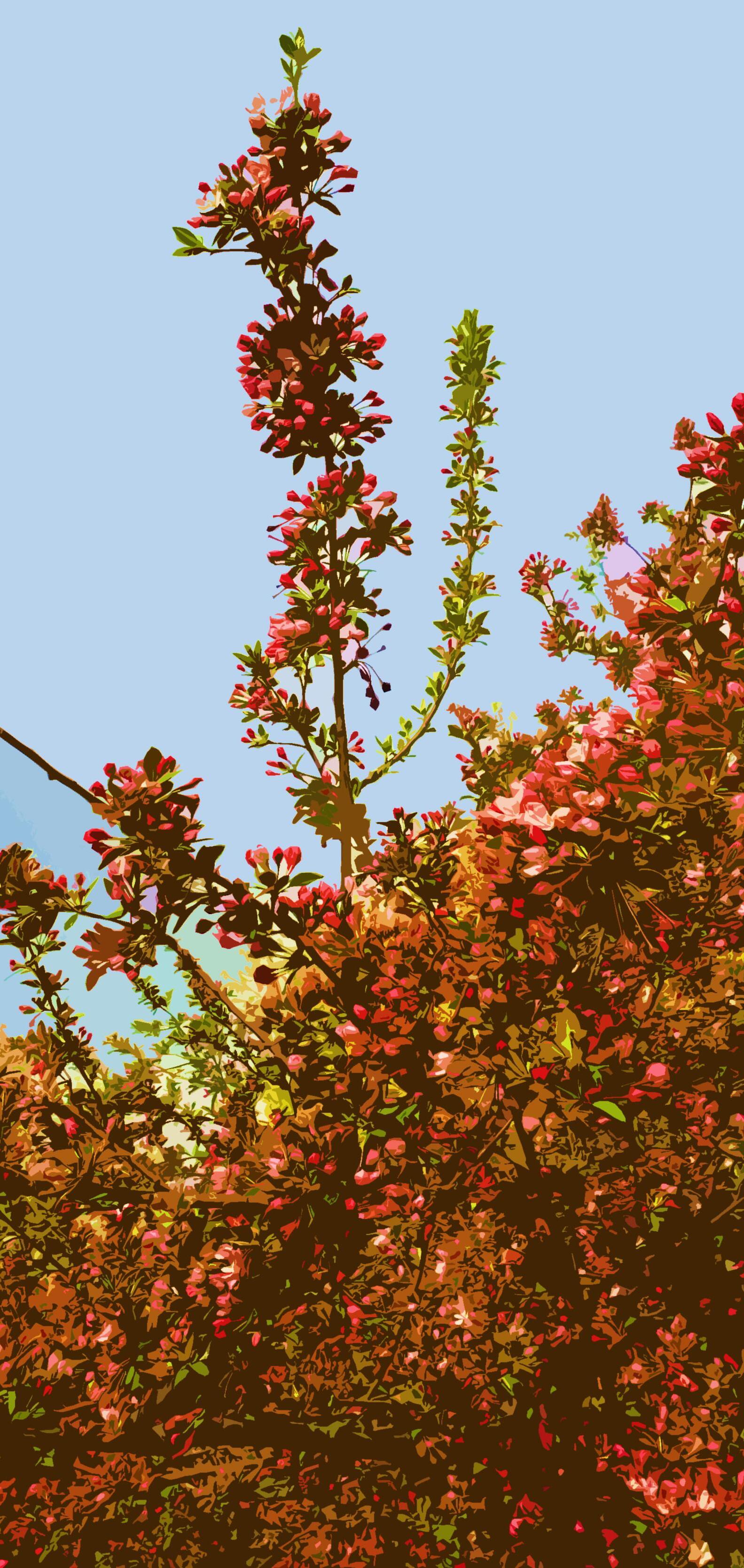Issue 31 Spring 2023
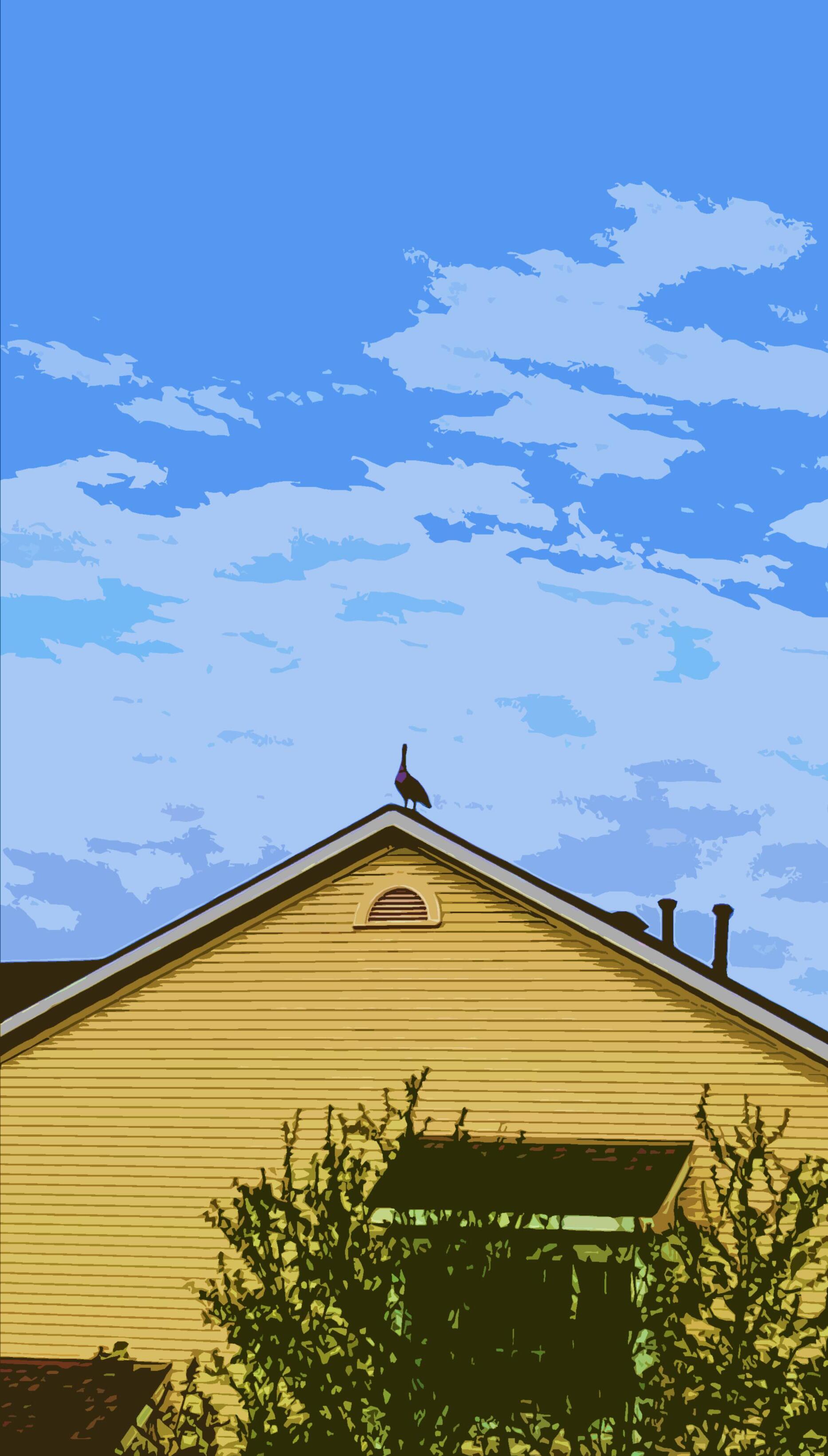
The Big Windows Review is a publication of the Writing Center at Washtenaw Community College, Ann Arbor, MI, USA. We publish poems and short (500 words or less) prose.
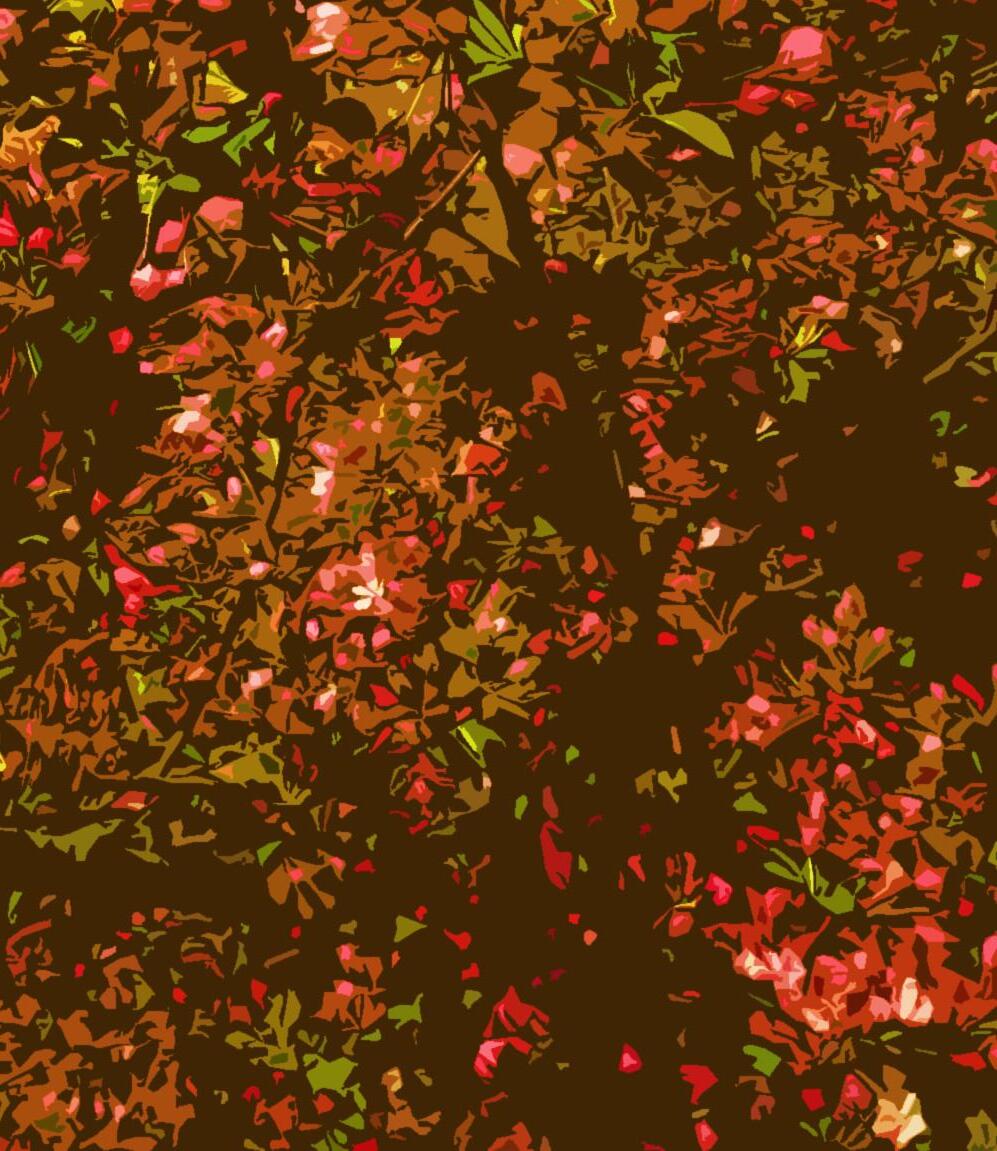
Design and digital images by Tom Zimmerman, Editor.
The works herein have been chosen for their literary and artistic merit and do not necessarily reflect the opinions of Washtenaw Community College, its Board of Trustees, its administration, or its faculty, staff, or students.
Copyright © 2023 the individual authors and artists.
Website: thebigwindowsreview.com
Email: thebigwindowsreview@gmail.com
Christopher Barnes Townscapes 1-5 5 Emily Black Luna 7 We Feed Dragons to the Moon 7 paul Bluestein Occasional poetry 8 Alan Catlin The Eggs of My Amnesia 9 Arvilla Fee Candles 10 George Freek Dialogue with the Moon (After Li Po) 11 In the Middle of the Night (After Tu Fu) 12 October Night (After Tu Fu) 13 Matt Gillick Headwater 15 Doug Hoekstra Offseason (Italian Sonnet) 18 Phil Huffy Promptitude 19 Maggie Nerz Iribarne Former 20 Jennifer Klein Summer Morning 21 Vyarka Kozareva Lace on the Haystack 22 Chain Reaction 22 Samo Kreutz No more empty ground (a haiku sequence) 23 Mike Lewis-Beck Bad Bar in Chicago 24 Thomas Mixon Break of Day 25 R. H. Nicholson Grief Train 27 ayaz daryl nielsen Seven haiku 29 Robert Okaji Hearse, Departing 31 In That Moment of Clarity 31 In This Gray Morning I Think of Hiroshige 32 Kenneth Pobo Meteorologist on a Calm Day 33 Nude Philosopher 34 Sharon Scholl Change 35 Jake Sheff We Install a Sump Pump on (What Used To Be) a Holiday (Take 8) 36 Roger Singer Night Flash 37 _3
Issue 31 Spring 2023 Contents
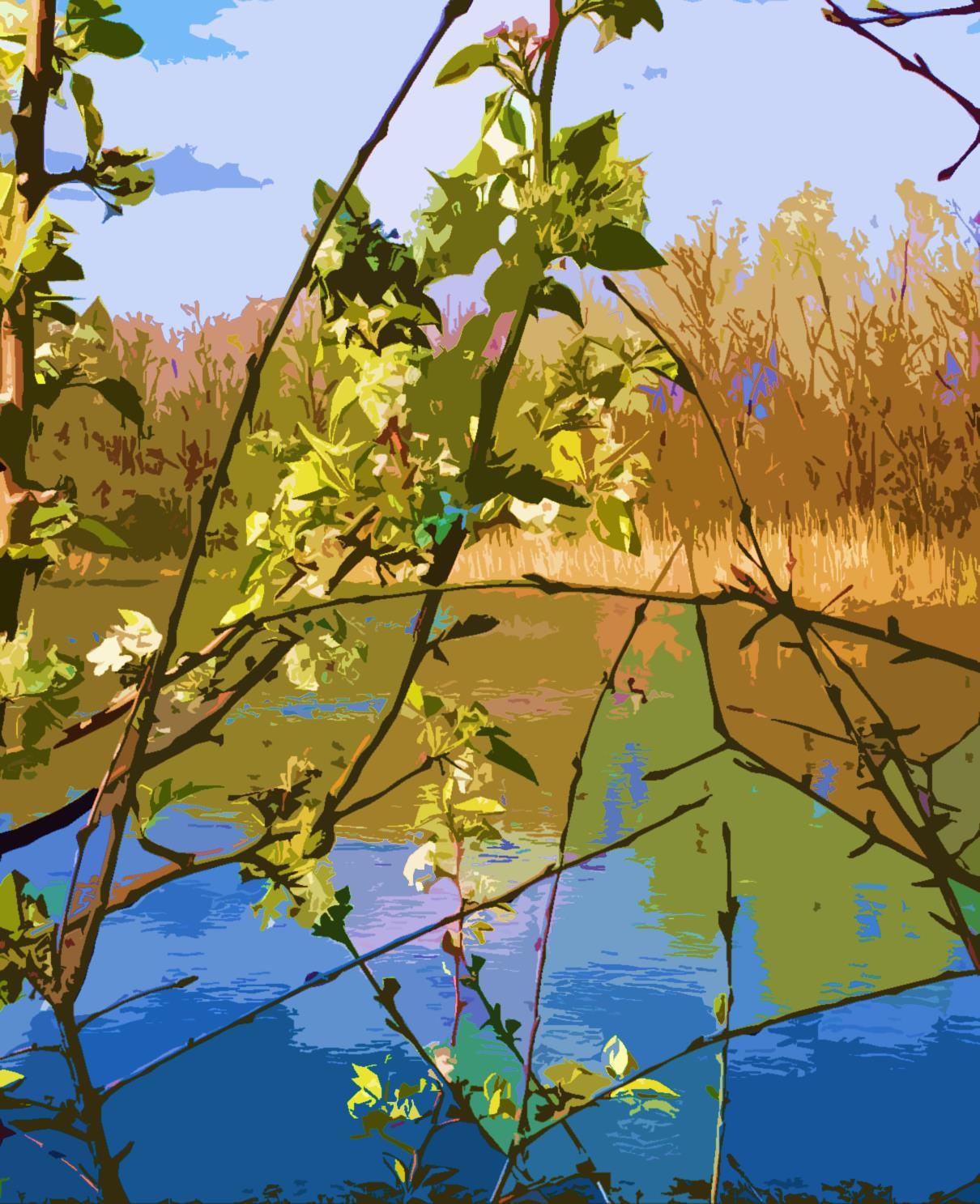
John Sweet like false kings growing fat on the corpses of children 38 Terry Trowbridge Atropos 39 Diane Webster Cracks Run 40 Brief Book Reviews 42 Contributors 46 _4
Christopher Barnes
Townscape 1
Striving-for-effect cornice, blunt pediment.
Forceful rhododendrons propel macromolecules.
Hived-off granite trench.
Bus creaks, hesitates…
Where Apollo dissolved intent.
Townscape 2
Colonnaded stairwell dwindles.
Gene-control pathways stiffen azaleas.
Hewed flint consumes time.
Playground swing flurries…
Where Gaia unwrapped the rum.
Townscape 3
Lumpish column, beams. Chemical signals jostle ivy.
Rough limestone facing.
Gusts tumble bin…
Where Horus disposed of girly pinafores.
Townscape 4
Inward-sloping wall constricts.
Winter cherry admits biological universe.
Half-lit bas-relief.
Morrisons bag deflates…
Where Aphrodite off-loaded taut brogues.
___________________________
_5
Townscape 5
Ashlar, upright, gouged. Lilies nod yielding tissue. Moldering paint on stucco. Skunk roach prangs… Where Demeter bent, feebly.
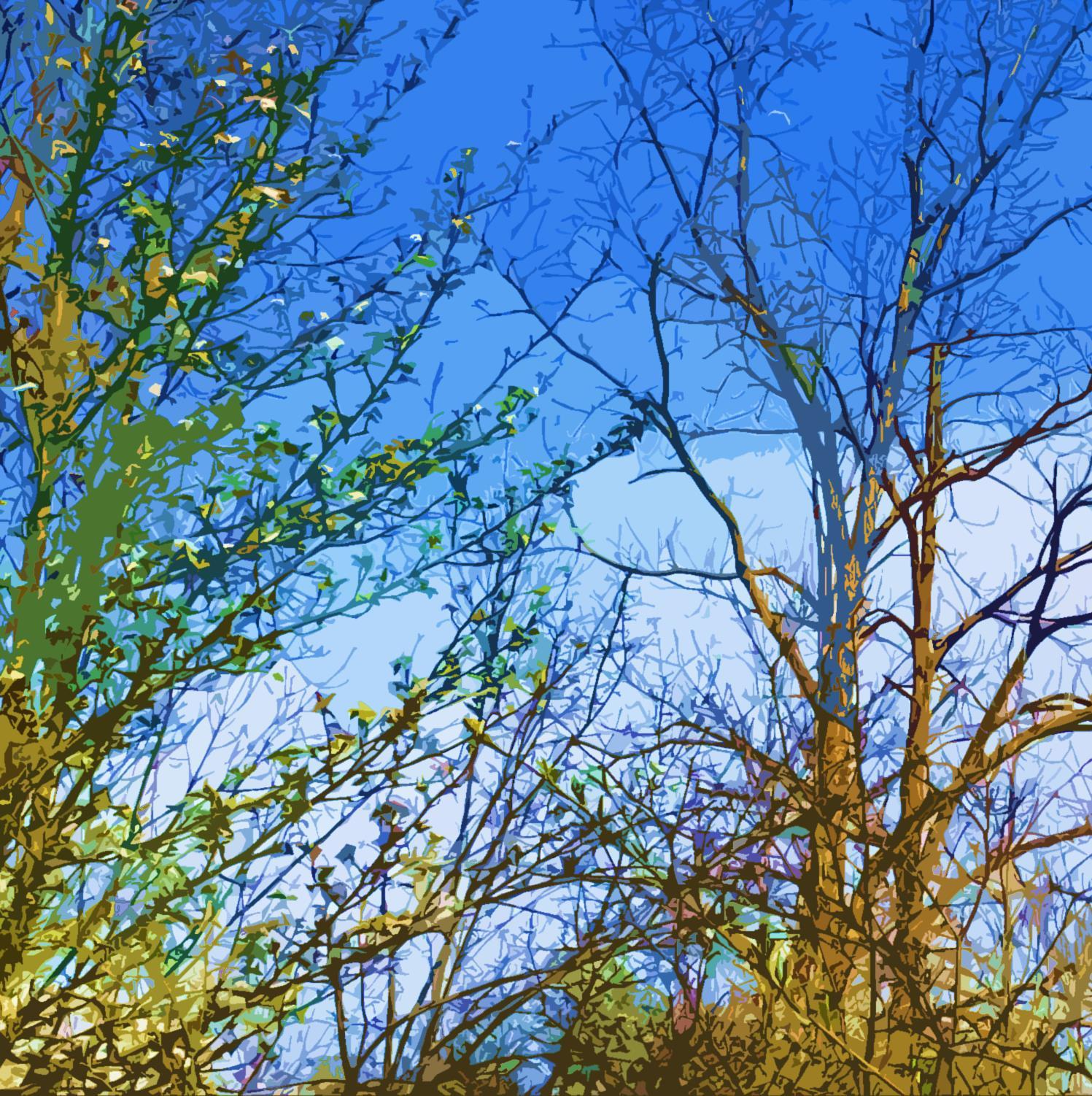
_6
Luna
When the music stops, we’ll melt into a seawater puddle, a puddle of tears. I’ll wear my yellow galoshes I had when I was five and pretend I’m a yellow-tailed mermaid.
My open arms are waiting. We’ll spin around the room, one limber octopus, two bodies that flow as one in a tango rhythm. Our eyes will lock together as we follow this gaze.
Neptune leads our dance well, but he forgets I’m not a true sea-being and he has no power over me. I am the moon whose golden-yellow chariot lights the night sky with deep, mysterious reflections.
We Feed Dragons to the Moon
Moon dust fuels our love madness. Breezes etch our bodies until they feel like sandblasted glass. Our minds give way to passion that suspends all thoughts and makes us one. We worship the moon, our heavenly mother, goddess of our love, and nurture her with rituals that send our fearful monsters into her ample arms.
Emily Black __________________________________
_7
Occasional poetry
Most poems are weekday, workaday prose, tucked into magazine columns or stared at by subway riders waiting for their station. Occasionally though, there is a poem that ascends to escape the gravity of the ordinary.
Comet-like, it streaks across the horizon of our imagination to give voice to a life, a loss or a dream. The poet knows what to say when no one else does and thus, is often assigned that most intimidating task –speaking for all of us when there are no words that seem sufficient.
________________________________
paul Bluestein
_8
Alan Catlin
The Eggs of My Amnesia
are all broken in a dream scripted by Brueghel nightmares, dwarf legs scampering like insects searching for a body, nude adults of both sexes collared by black cylinders, discs that capture filthy rain, the offal that drips from a putrid sky; a torn backdrop, partial wall hangings are composed in mixed media: cloth tapestry, oil-based portraits of demon children, underworld lovers completely deformed, burnt offerings behind sheer skin curtains, howling monks, the voices of the damned trying to remember the pillaged feast, remnants scattered about this cluttered studio floor: the empty flagons, eviscerated bones, skulls and mirrors, mirrors and skulls.
___________________________________
_9
Candles
How briefly they burn wax trickling down the sides, tears of loss, beaten down, bankrupt, flame flickering, wavering with each gust bending, regaining rigidity, bending again, wicks blackened by time, by carbon
your carbon and mine, smudged shadows on the wall, an attempt to make us bigger than we are, hot wells recessed, how little wick is left to kiss the match that keeps us burning.
___________________________________
Arvilla Fee
_10
George Freek ________________________________
Dialogue with the Moon (After Li Po)
After last night’s frost, autumn leaves die fast. The days are brief. The nights are long. I drink a glass of wine to forget the past. I speak to the dead moon in an uncomprehending sky. In a freezing rain, leaves blow over your grave. You were forty-five, But no one is too young to die.
_11
George Freek ________________________________
In the Middle of the Night (After Tu Fu)
The sky is a clock without a face, as the day ticks to a conclusion. Some stars appear. Hanging in the air like lanterns, lighting the way to nowhere. The river meanders in haphazard fashion, without cares, without dreams, without passions. An owl awakens, leaving his tree, searching for a victim. For some tiny creature, it will be the last night of his unmemorable life.
_12
October Night (After Tu Fu)
A black fog hangs like a disease from the frozen trees. If I could, I would pray, but what would I say? The sky turns dark, as if hiding unspeakable sins. Leaves fall from my sapless trees. They shudder, dancing to death in the night air. A solitary raven circles the darkening sky. He glides with a purpose. He doesn’t look at me. And as winter closes in, his thoughts are deadly.
________________________________
George Freek
_13
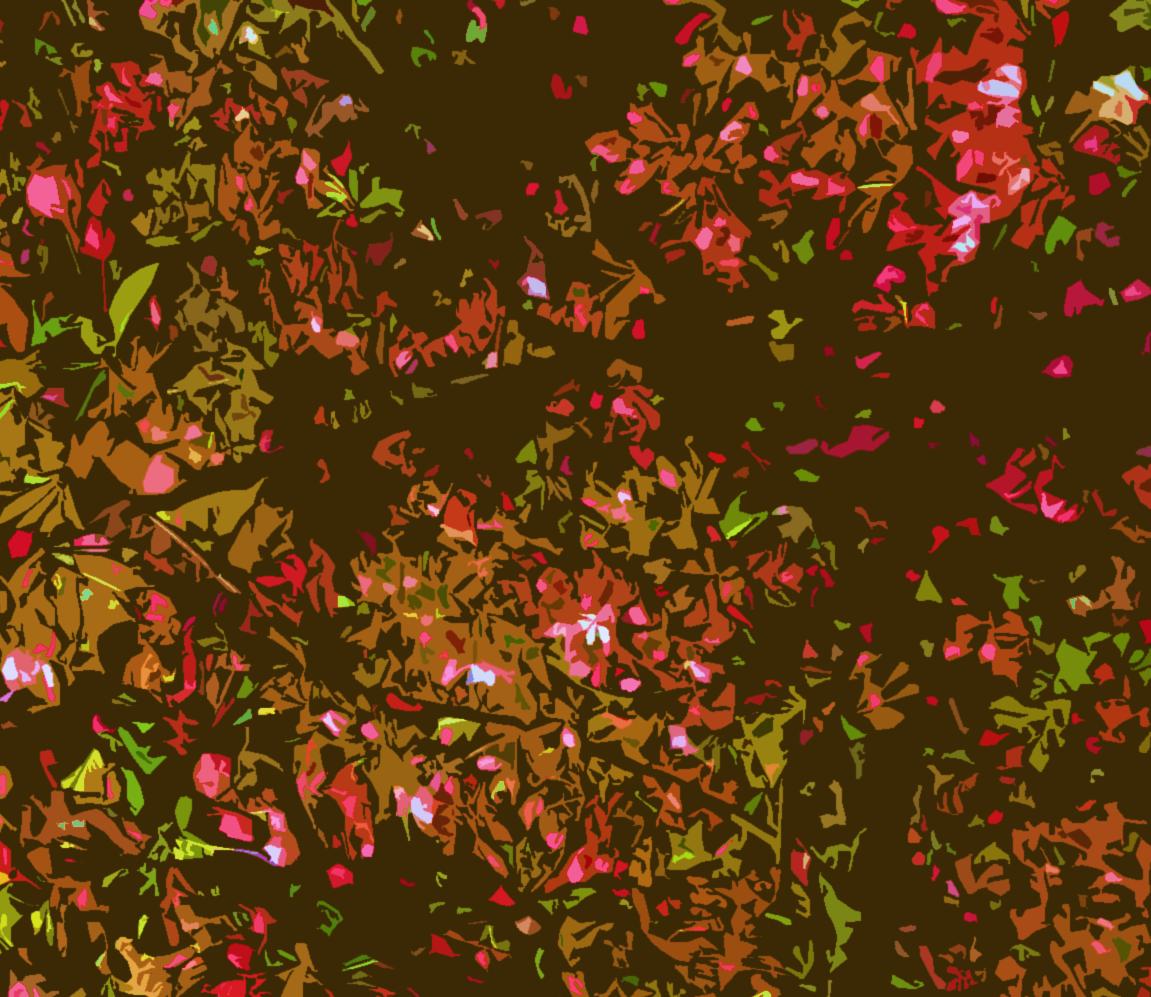
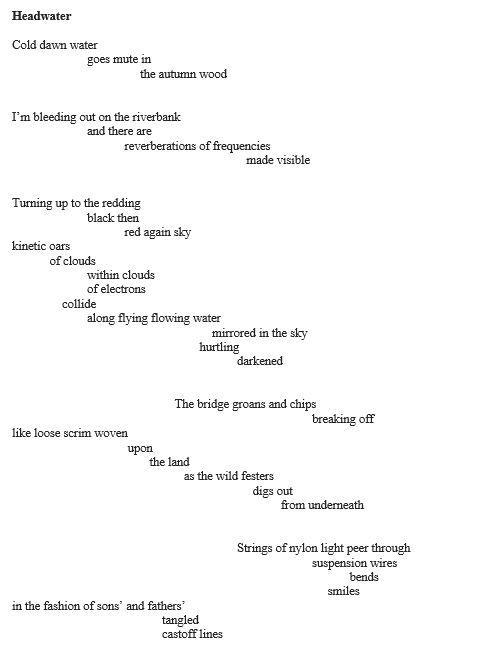
__________________________________ _15
Matt Gillick
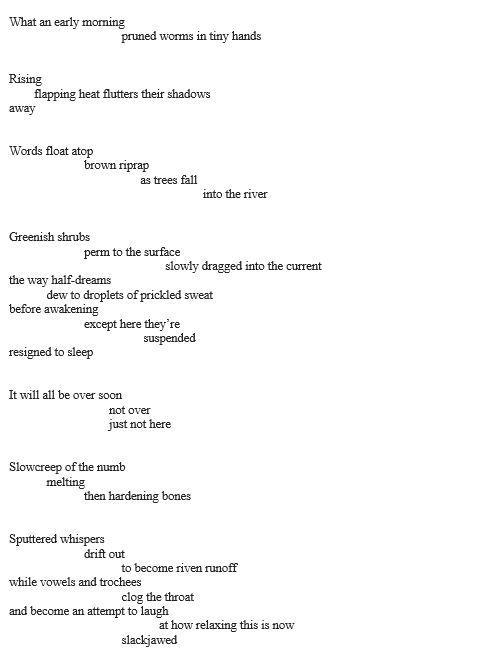
_16
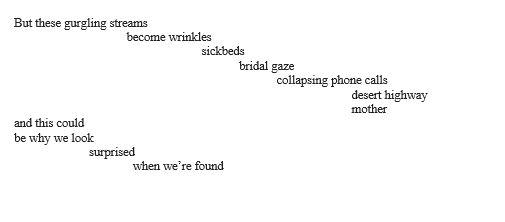
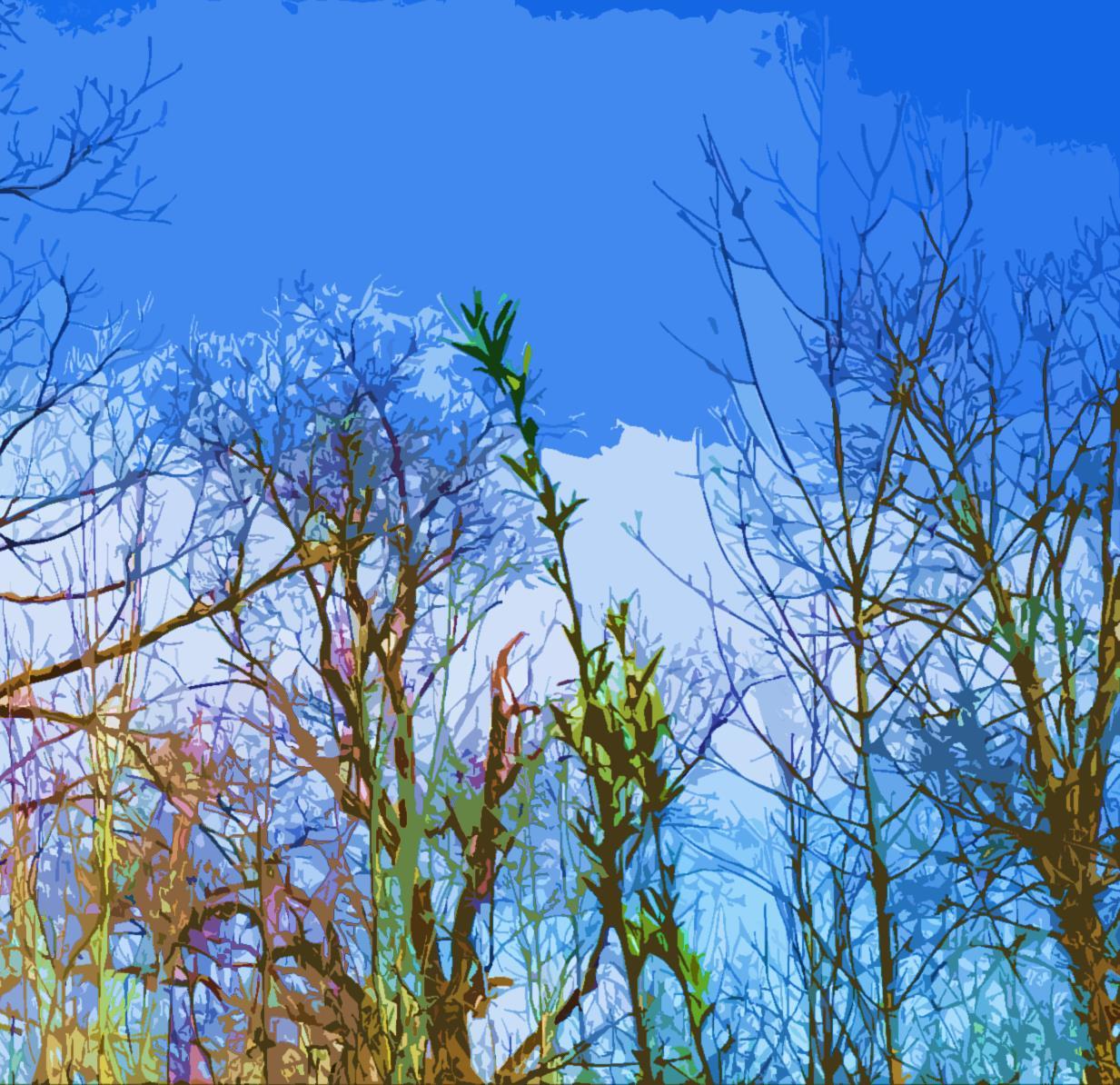
_17
Offseason (Italian Sonnet)
Offseason. Dusty windows shuttered tight
In the blackness, I listen to her sleep
The rise and fall of interrupted dreams
Shallow waters. The edge of ocean tide
Lost afternoons. Small moments magnified
Paintings of horses. Landscape stucco scenes
Lined the walls of our hotel by the sea
She huddled close, the one I still rewind
No histories or stories to be read
Baggage lost or never bought. Two unclaimed
By a future that wasn’t ours to see
Magic. In the hollow of our bed came
The turning of a string of present days
Fading, I still remember how she sleeps
_______________________________
Doug Hoekstra
_18
Promptitude
Oh yes, a window, there always seems to be nearby, a window, so, onward, lucidly.
Perhaps that window looks from the second floor and such a window reveals a little more.
But you, dear poet, have not the only one and now, poor poet, your job has just begun.
To write, a poet requires poetic eyes. Alas, good poet, that’s where the challenge lies.
___________________________________
Phil Huffy
_19
Former
Pressing his black trousers again, the steam hisses and sputters. I smooth out the faint lines, push in a crease. The children, who watch me from their framed faces lining the walls, are at school. In another frame- our holiday group shot-the five of us standing beneath looping words: Merry Christmas from the Phillips Family, the children are decked out in holiday greens and reds. My husband and I wear off tones. He dons a purple sweater with his black slacks, “Because it’s technically Advent,” he said at the time. For no good reason, I wear a butter yellow turtleneck. I fade into background, like an unlit candle
I shift the trousers from the ironing board to my husband’s side of the closet. They line up in smooth order, a sight I know will give him pleasure, provoke a peck on the cheek while I wash dishes.
He wears the black trousers always, whether at the office or mowing the lawn. He refuses the khakis, jeans, and corduroys I bought him at the beginning. They stay neatly folded in a stack on a shelf. He would never consider giving them away. “They were a gift from my wife,” he says, “it’s unthinkable.”
I slide the rounded triangle of my iron across swathes of dark fabric, acquiescing to the encroaching memory – the first time he let go, pulled me in, my bottom meeting his black lap, my arms and legs wrapping around his chaste body.
“Slut,” that’s what the parishioners called me.
“Savior,” is what my husband said, just that first time.
I work the last pair of his black trousers, repetitive motions across the flat surface, attempting to tease out that final stubborn wrinkle.
Maggie Nerz Iribarne __________________________
_ 20
Jennifer Klein
Summer Morning
On a summer morning
I witnessed dew on the grass
The air was crystal cool
In my mind, I bent down
And let the elements do with me
What they will
Sun-drenched dewdrops
Birthed from their lushness
Wandered into the crevices
Of my heart, emanating
Glow-in-the-mornlight
Bioluminescence
They showed me The Way
Of my future
Sang it to me
With just as much Cackling
As Wisdom
________________________________
_21
Vyarka Kozareva ______________________________
Lace on the Haystack
The bride wore the sweet smell of acacia
Like royal robes, with dignity.
The summer was sleeping in her copper curls
The honey was melting on her tongue.
Her breath a healing whiff,
Her eyes crystal vials
Keeping secrets.
Chain Reaction
Yesterday, I wanted to memorize you
Cutting red jalapeños
On the kitchen board.
Because
The spirit always conquers the flesh
It’s the charming chrysanthemums
In your lap
That will make me panicked tomorrow.
If you lick your wounded finger today, Your blood will clasp my throat, My saliva will heal your pain.
_22
Samo Kreutz _________________________________
No more empty ground (a haiku sequence)
furrows already sown in them the bird’s sounds
planting beans a small child speaks about the cosmos
lettuce seedlings no more on a bare ground his shadow
watering flowers all the new shoots of her stories
_23
Mike Lewis-Beck
Bad Bar in Chicago
I’m in a bad bar in Chicago but not as bad as your tarot bar. The ranter next to me explained, between bites of bone, that he now understood everything and didn’t need to explain. I said I understood. He left, not themed but he did have a lime windbreaker and I thought of a gimlet. So I ordered a gimlet although then I knew I wanted a Gibson like Chandler. Still I wonder which of your 4 cocktails are your inventions? Which two? Must be Smile cause of the calamus and Corpus cause of the Cherry Herring which broke all over me when I was hit by a biker in Guatemala City in 1967 and I thought it was The End Of The World. But it only ended the Cherry Herring.
______________________________
_24
Thomas Mixon
Break of Day
On dark mornings I go walking in the frozen tracks the trucks I don’t look out for made, gloves askew, head turned down, eardrums stuffed with sticky rhymes from skeletal verses, and hoof prints dirt road petrified, which I ascribe to horses, which can’t be right, it must be boars, escaped
from rich folks’ hunting grounds, game preserve across the highway, and the broken fence forbears its tale, not that I’d listen, as the ledge begins
to crest, and only then do I look up to verify that I’m alone, to make sure I’m not asked to console another passerby, that I won’t jump,
I won’t, I haven’t yet and have no plans to start, and I’m relieved by the diluted sun paltering with clouds, sprawling landscape empty of a single soul who wants to sell me hope, and it’s a joy to turn around and unexplain myself to scalloped ground, faltering, then falling.
_______________________________
_25
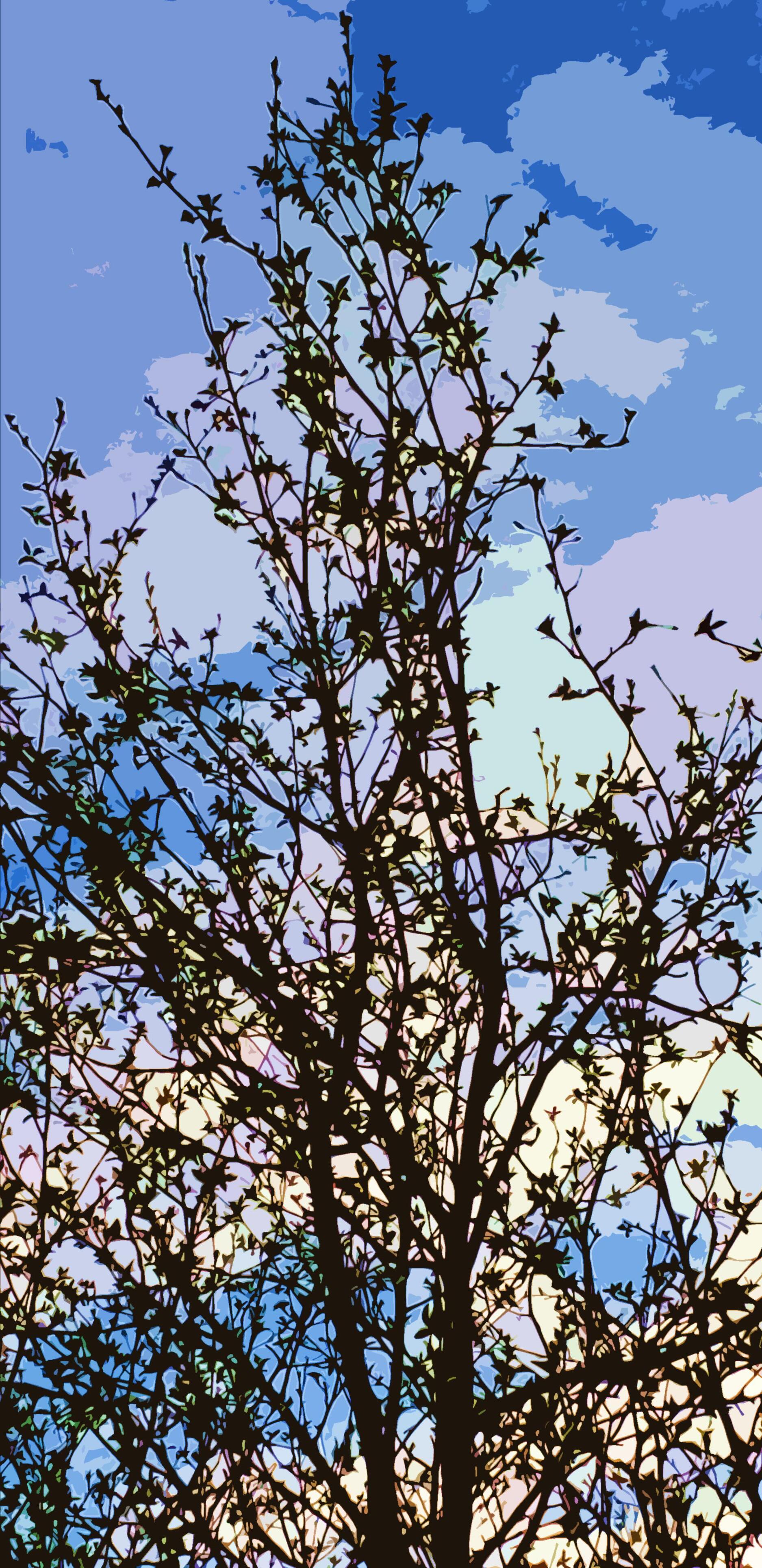
R. H. Nicholson
Grief Train
The Grief Train
Pulled into the station
Onyx black
Steam hissing
Angry, sullen, And I handed the porter my single ticket For grief is a solitary passage. I claimed my seat, Facing backwards, The only option, Nearest the couplings
Clanging in the gloam, The rhythm of nihilism
Gnawing at my brain, And watched the others board: A Latina whose daughter drowned in the Rio crossing, A lamenting veteran, A husbandless wife, A father whose son slipped Through his fingers, A sister who survived the massacre, A lover lost.
We sensed that we did not sense each other, And traveled in silence, Blur in the windows, Arctic air at our bones, With beads and bibles, Photos and fragments, Tears and trinkets, Clutched to our hearts. And we rode.
After hours or months or decades or days,
_______________________________
_27
(For one is as the other),
The iron horse crawled to a stop. We sat, All of us
In silent stagnation, Until the porter gently Ushered us
To our destinations, Surprisingly all the same. I disembarked, Numb and knotted, And followed the path, Of crucible stones
To the other side
Of the languishing locomotive, Stood in line, Until the porter punched My ticket, And I boarded the Grief Train Again.
_28
geese walking on ice each careful, focused web-step… echoes from my heart through our big window dreams of loving peacefulness opening it wide
all of them, fallen imaginary angels prancing through my dreams underneath these ribs missing the presence of you my heart pumping tears the world ends somewhere but not here nor today kissing her again behind shrubbery howling like a pack of wolves neighbors and I, laughing
ayaz daryl nielsen ____________________________
_29
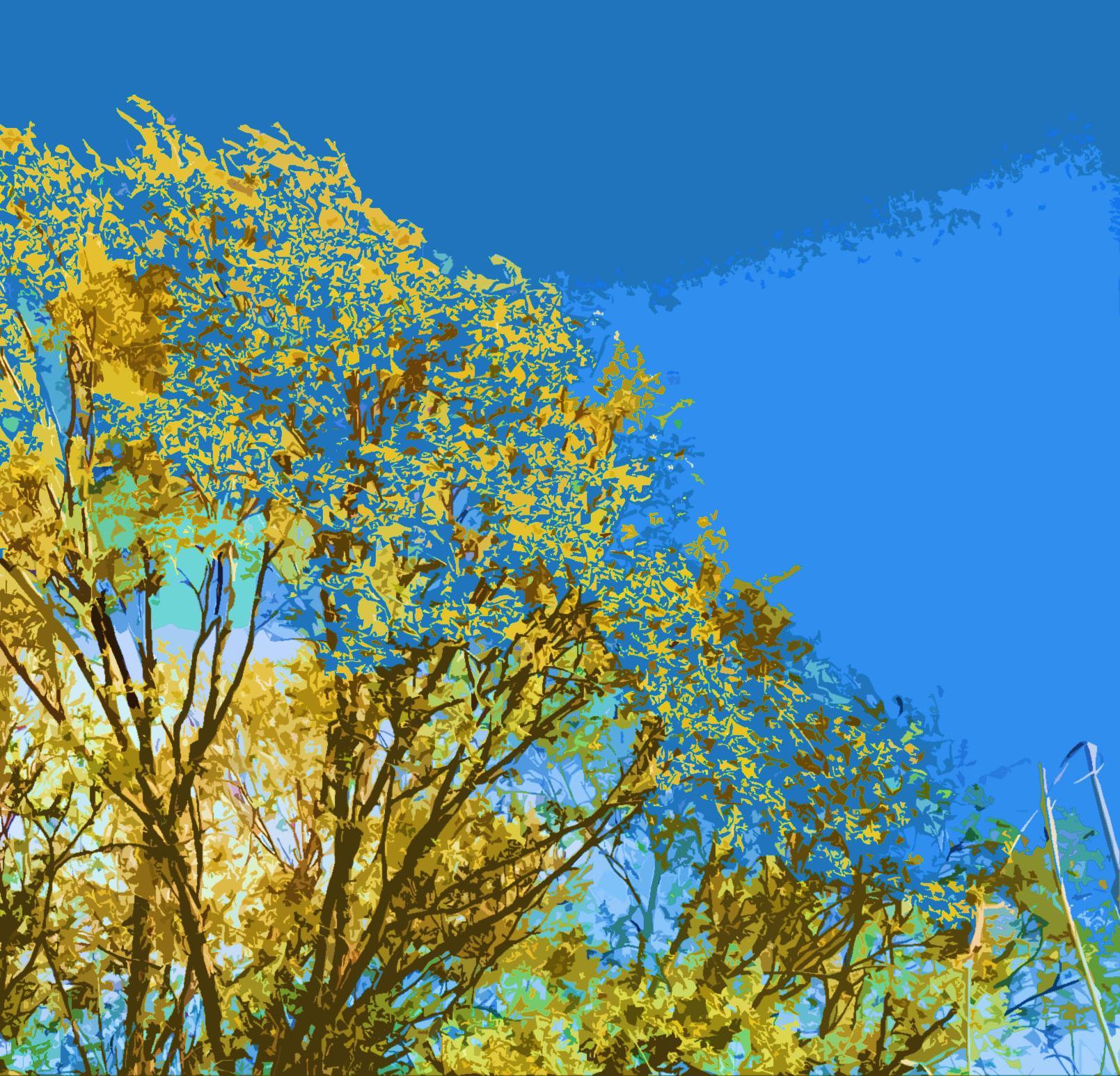
_30
this poem makes its stand critiques my uncertainty, and states, “I’m complete”
Hearse, Departing
Not waiting for God. Nor that light glancing off the windshield, leaving us farther behind in the blurred passage. Grief is a cold engine, a stump, a daily migraine. Not force but absence. Gray sky clamping down on the sun-starved chrysanthemum. Our goodbyes, incomplete.
In That Moment of Clarity
Body of moon, body of light. That central point moving ever outward through avoided bliss. No one suited you. Spring became autumn and your hair thinned as the soil dried, inept, harsh, a howl caught at the throat of the blurred lens in the owl-eye of contention. Missteps expanded in tongue-slipped days, and you slurred forward. Yesterday’s lapse. Today’s misdeed. Another’s intent. My mistake was living.
Robert Okaji _________________________________
_31
In This Gray Morning I Think of Hiroshige
Hummingbirds pause at the agave blossoms. Sunlight trickles through dense clouds. I stand sweating in the emptiness. Hiroshige, too, acknowledged oblivion, leaving his brush in the East, having completed a final task. Facing death, he sought the Western Land. In this space nothing fills me with desire. As you, in your unknowing, observe the flow.
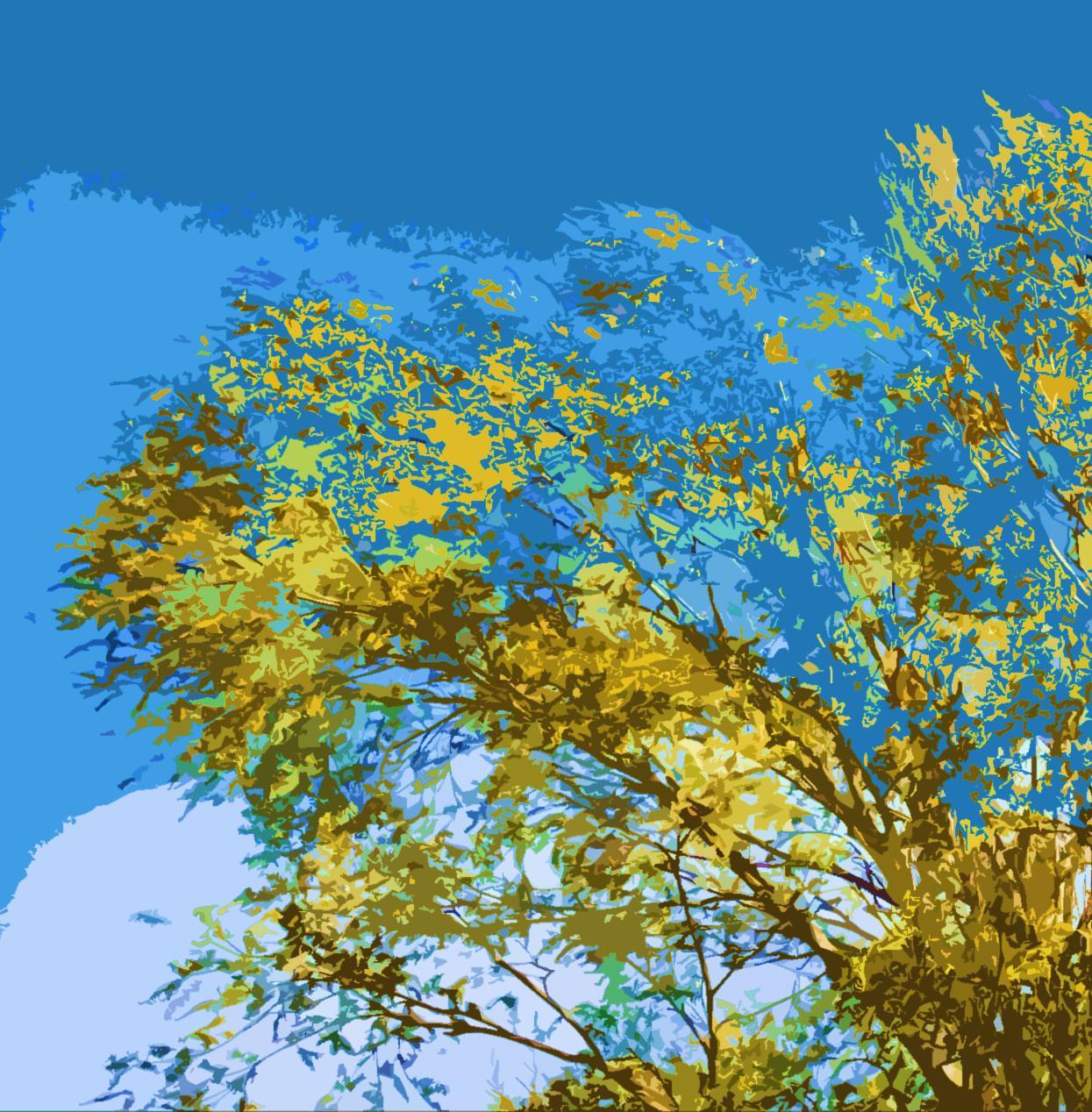
_32
Meteorologist on a Calm Day
I can’t even speak about clouds, the sky an unforgiving blue. I climb the sun’s gold ladder to heaven but it’s empty. Everyone returned to Earth
to enjoy a perfect day. No wind, just a slight breeze to tease open the eye of a violet. An angel almost slipped on morning dew, but it grabbed onto a lilac just in time. I’m probably
the only sad person, rain far away. I could indicate what might appear in tonight’s sky. Look up
and see Jupiter, a world with real weather, a huge red spot gashed into it for centuries. Or Neptune with 2000mph winds.
What can I offer but 75 degrees and a bluebird preening on a flagpole?
Kenneth Pobo ________________________________
_33
Nude Philosopher
I peel off my clothes. Under fabric, the same old me, breathe in, breathe out, cars roll by, and my parrot theorizes on my shoulder. I think that I think better naked, but my ideas come fully dressed, soldiers in formation. Why did I tell them that they could live with me? It’s time that they fledge, make their own nests. Usually I keep
each room dark. A light bulb hangs down by my bed. I turn the day on and off. I’m often asked about the meaning of life. I point to the sky and say “Clouds.”
I guess it sounds deep. My favorite flower is a dahlia. Blossom and go. Redden something along the way.
Kenneth Pobo ________________________________
_34
Change
Fall comes whistling softly like one who wants to be felt but not yet seen. It’s like holding and holding a door ajar, hoping the cat will choose in or out.
After long, sweaty months with night settling in by ten p.m., dawn knocking us awake, a flash bulb at six a.m., the long dusk folds its gray curtain, shaking out cool morning mist.
Time that held its breath for days while heat rose in waves expels it with a sudden wind that causes windows to fly open, houses to inhale, cough out mildew.
We shed a season’s lassitude, gearing up brain and bones for some slow forward movement.
We are on the verge, perched between skin and sweaters.
Sharon Scholl ________________________________
_35
Jake Sheff ___________________________________
We Install a Sump Pump on (What Used To Be) a Holiday (Take 8)
It’s good to be home, son. This storm must be Re-examining its assumptions, or giving us The silent treatment. Let’s put on London Calling, After this Tchaikovsky number. Try to put your Body into it a little more, like you’re contending With a vortex full of ancient and angelic thoughts!
Screw that in tighter; make a seal. I read a lot Of H.G. Wells in prison, thought a lot about foxGloves at Fort Stevens in the needy months of Rain. Camping? If your mother’s permission slips On a banana peel. First, we better persuade this Crazy sump pump to at least pretend it’s not
Insane. The warden looked like the spectacled Eiders we used to see up north. In this weather, My hands conceive better than they combine. Work Tastes like the salmonberries at Oxbow Park, When the shotgun shells and fabric softener above The vortex are mine. I’m dumber than a rifled slug.
_36
Roger Singer _________________________________
Night Flash
city without sleep
angels at the corner
light and shadows, a siren owns the air
marching shoes, a sidewalk melody
street pipes, steam songs
blue night
black hawk
_37
like false kings growing fat on the corpses of children
a different assassination in a later century, but the idea remains the same history written lightly in pencil in case the names need to be changed one small step in someone else’s idea of the right direction you invent a cause, and then you figure out who needs to die for it
__________________________________
John Sweet
_38
Atropos
When I cut my hair I will bury it in the stream behind my parents’ house so that the bog will digest it. It will lace together the dreary bacteria and cold peat and be the anchor for frog eggs and the hibernating smell of toad holes in the winter.
When I cut my hair I will leave it under a tall tree so that birds will weave their nests from it. Embryos will grow in my wooly warmth. Later, abandoned to the branches crows will pick at it, wasps will pack mud on the balled up clogs, squirrels might tie them around packages of walnuts.
After I cut it and find a spool, I might count my hair, one a day, to find out if I have more hairs on my head than days left to live. Or I might string them over a loom in a ritual with some disregard for colours and a need for earthy smells.
_____________________________
Terry Trowbridge
_39
Diane Webster
Cracks Run
Grass in pavement cracks runs across the black top like green rivulets of lava surging, overflowing banks, creating new avenues until weed killer spray browns growth in its tracks; sea water blackens molten stone into granite plugs as steam scowls skyward until somewhere else a shift in surface sprouts another crack, and dormant roots seek escape.
_______________________________
_ 40
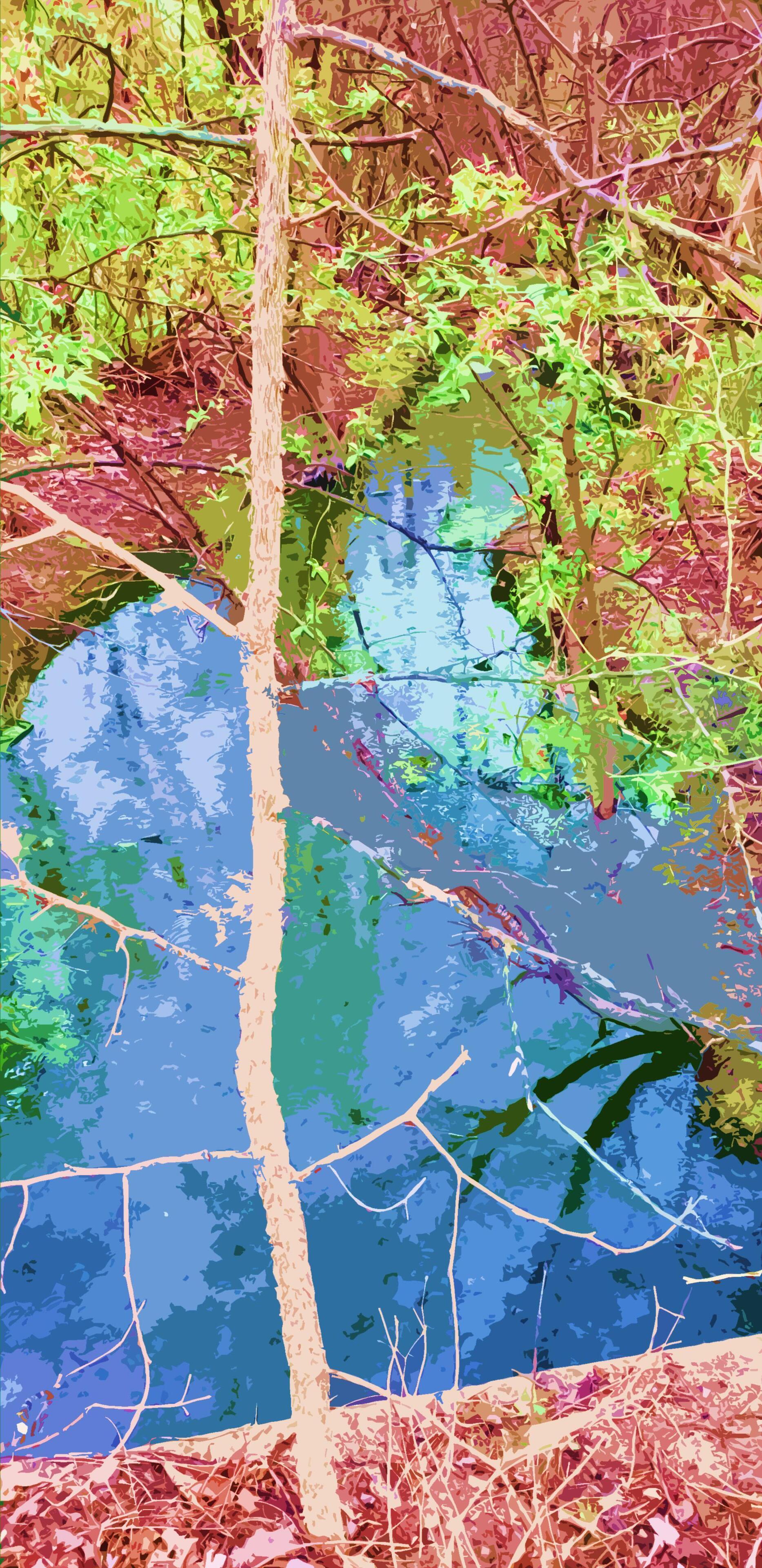
Brief Book Reviews
Greenspan, David. One Person Holds So Much Silence. Driftwood Press, 2022, 77 pp.
Blood, spit, mirrors, prescription drugs: these are the images that stick with me after having read David Greenspan’s smart, gritty poetry collection One Person Holds So Much Silence. Waves of pain, waves of painkillers: this is how I would describe Greenspan’s poetic line. For example, take these lines from the book’s opener, the wonderfully titled “Poem for a god of my own understanding”:
Florida covered in cuticle mush warm throat pink bloated with Vicodin no spit to speak of how many times can I find myself covered in honeysuckle before I wise up
Or the closing lines from one of my favorites in the collection, “Poem for Florida”: The sun touches itself in the backyard as the dead mosquito around its ugly medicine. I sit rat tail against dandelion stem, bruised as ground fruit and drinking from a hose.
Or these, from the long piece that closes the book, “A Poem to Pass the Time”:
I look balder than I feel like a hardboiled egg a quick mouth a seasick ache I was never
___________________________
_ 42
mentally ill just unfit for production pessimism of the spirit the feeling of a twenty-dollar bill slid firmly between teeth
There are many other excellent poems: “Skinny Fisted Sons,” “The first time my father cut himself,” “Palliative on a Rooftop,” “Body by Adderall,” and both pieces entitled “An incomplete history of.” An added feature at the back of the book is a revealing interview of Greenspan by Jerrod Schwarz. All in all, a very satisfying collection.
–TZ, 22 February 2023
Schneider, Peter. In the Field of Unintended Consequences. PB&J Books, 2022, 100 pp.
Two long, rangy, allusive poems, “Wild Chervil” and “Gingko and footnotes,” frame Peter Schneider’s excellent full-length collection In the Field of Unintended Consequences. Both poems blend physical description, scientific fact, environmental consciousness, and Eastern and Western philosophy in mostly unpunctuated, rarely enjambed free verse that, to my ear, uses human breathing to determine its line lengths. Here’s a stanza from “Wild Chervil”:
And isn’t it the same deal with mental weeds the word-and-thought chervils ah, disingenuous me on my black zazen cushion plucking out what always comes back
And this, from “Gingko and footnotes”:
*gingko. . . just living its life private in public like this room of yellow light
_43
and books suspended in the organic mechanism of the city
These excerpts also display Schneider’s skill with using metaphor to connect and extend his ruminations. Similar skills and techniques are evident in the book’s other ten poems: the nine-part “Quilted Pillows” employs as a controlling metaphor certain microbes from the Ediacaran Period (which occurred five or six million years ago, according to my Google search); “Openings” is a fourteen-part poem mixing the physical and the metaphysical; “Black Garnet” presents a clever metaphor for the workings of language and the mind; “China” blends memory and Eastern philosophy; “Springs” travels “from Spain to Macedonia”; the twelve-part “From the Book of Numinous Dreams” is just that; “Letter to Space” and “Everywhere men speak in whispers” ponder the imagined end of our planet; “The Coraçon Function” deftly employs a heart metaphor; and “Philosophy Library” ends beautifully with “there is no good reason / why things matter / just that they do.”
–TZ 19 February 2023
Solonche, J.R. It’s About Time. Deerbrook Editions, 2023, 69 pp.
Accessible, aphoristic, big-hearted, and humorous, J.R. Solonche’s It’s About Time is a delightful poetry collection. Most of the poems are short, often two to a page. Here, in its entirety, is one of my favorites, “Three Butterflies”:
I do not care about the pair. It is the third one that my heart goes out to.
Another favorite of mine is the collection’s closer, “When the Time Comes”:
When the time comes, I want to be waiting there.
_44
I have something to say that I do not want to say behind its back. I want to say it to its face as all important things need be said. When the time comes, I want to be there, waiting.
Of course, the book also features longer poems. Memorable to me are the book’s opener, “Time,” which juxtaposes a physicist’s notions of time with the speaker’s discovery of a dead opossum during a morning walk; “In the Bar,” in which the speaker and a friend discuss a good-looking woman sitting nearby; and “Virginia Beach,” a childhood-reminiscence piece that ends with these thoughts about the speaker’s mother: “She just didn’t tell the whole truth. / She would have made a great poet.”
And, speaking of great poets, Solonche alludes to quite a few. William Stafford and Stanley Kunitz, clearly touchstones for the poet, appear together in “Pictures.” Immediately following, “The Soul’s Sea” namedrops A.R. Ammons. “Dim Gold” conjures Frost’s great “Nothing Gold Can Stay.” “Shadows,” with its mysterious hawk, brings to mind Wallace Stevens’s blackbirds. Solonche even gives us a tragicomic tribute to Dylan Thomas.
I’ll close with Solonche’s poem “Introductions”:
It’s good to know about them before you dive in, I suppose. I guess it’s helpful to be prepared, but I never read them. You’ll know right away how warm or how cold the water is.
There’s little doubt about the temperature of It’s About Time.
–TZ, 10 March 2023
_45
Contributors
In 1998, Christopher Barnes won a Northern Arts writers award. In July 2000 he read at Waterstones bookshop to promote the anthology Titles Are Bitches. Christmas 2001 he debuted at Newcastle’s famous Morden Tower doing a reading of poems. Each year he read for Proudwords lesbian and gay writing festival and partook in workshops.
Emily Black, second woman to graduate in Civil Engineering, University of Florida, enjoyed a long engineering career. She is published in numerous journals. Her first book, The Lemon Light of Morning, was published in 2022. Her second book is scheduled for publication in 2023. She wears “Firecracker Red” lipstick.
paul Bluestein is a physician (done practicing) and a blues musician (still practicing). He lives in Connecticut near a beach where he finds quiet time to think about the past, and wonder about the future. In addition to work appearing in a wide variety of online and print publications, he has had two books of poetry published –TIME PASSAGES in 2020 and FADE TO BLACK in 2021.
Alan Catlin has several new books out in the past year, including Exterminating Angels. His How Will the Heart Endure, a labor of love about the life and art of Diane Arbus, was just accepted by Kelsay Books. His long-lost book Altered States, a cross country trip of a United States of the mind will be out in 2023 from Cyberwit.
Arvilla Fee teaches English and is the poetry editor for the San Antonio Review. She has been published in numerous journals, and her poetry book, The Human Side, was released this month. For Arvilla, writing has always been about making connections with ordinary people who will say, “She gets me.”
George Freek’s poetry appears in numerous Journals and Reviews. His poem “Written At Blue Lake” was recently nominated for a Pushcart Prize. His collection Melancholia is published by Red Wolf Editions.
Matt Gillick is from Northern Virginia. He received an MFA from Emerson College in 2021. He is a co-founding editor of Cult Magazine. Recent or forthcoming work in decomp journal, Lucky Jefferson, and Duck Duck Mongoose.
_________________________________
_46
Doug Hoekstra is a Chicago-bred, Nashville-based writer and musician, educated at DePaul University in the Windy City (B.A.) and Belmont University in the Music City (M.Ed.), whose prose, poetry, and non-fiction have appeared in numerous print and online literary journals.
Phil Huffy writes early and often at his kitchen table, casting a wide net as to form and substance. His work has appeared in dozens of journals and anthologies, including Schuylkill Valley Review, Eunoia, Pangolin, Orchards Poetry, The Lyric, and several haiku publications.
Maggie Nerz Iribarne is 53, living her writing dream in a yellow house in Syracuse, New York. She writes about witches, dys/functional relationships, small disappointments/pleasures, the very old, bats/cats, priests/nuns, cleaning ladies, runaways, struggling teachers, neighborhood ghosts, and other things. She keeps a portfolio of her published work at https://www.maggienerziribarne.com.
Jennifer Klein is an American writer. Poetry is one of her favorite ways to make social commentary and merge her inner and outer worlds. Her poems have been featured in Fahmidan Journal, Bombfire, and elsewhere. She studied English, Dutch Studies, and Norwegian at Indiana University Bloomington. Follow her on Instagram @JenniferKleinReal
Vyarka Kozareva lives in Bulgaria. Her work has appeared in Adelaide Literary Magazine, Ariel Chart, Poetry Pacific, Basset Hound Press, Bosphorus Review of Books, Mad Swirl, Ann Arbor Review, Fevers Of The Mind, Juste Milieu Lit, Trouvaille Review, Aberration Labyrinth, Triggerfish Critical Review, Sampsonia Way Magazine, and Synchronized Chaos Magazine.
Samo Kreutz lives in Ljubljana, Slovenia. He is the author of ten books in Slovene and three in English (they are haiku books, titled The Stars for Tonight, A Time Different from Ours, No Bigger Than a Crumb, all published by Cyberwit.net). His recent work has appeared in The Heron’s Nest, The Big Windows Review, Ink Sweat & Tears, Green Ink Poetry, First Literary Review East, Ariel Chart, and others.
Mike Lewis-Beck writes from Iowa City. He has pieces in American Journal of Poetry, Alexandria Quarterly, Apalachee Review, Aromatica Poetica, Big Windows Review, Birdseed, Blue Collar Review, Columba, Cortland Review, Chariton Review. He has a book of poems, entitled Rural Routes.
_47
Thomas Mixon has fiction and poetry in Barren Magazine, Wrath-Bearing Tree, Rogue Agent, and elsewhere.
R. H. Nicholson is a professor emeritus of English, a writer, poet, playwright, and public speaker who spent forty years teaching in high school and college classrooms. His work has appeared in The Back Porch, New Poetry, Echo Ink, The Blue Lake Review, Wordmongers, and The English Toolkit. He was a contributing author in the book From Vision to Action. He won the 2015 Cincinnati Poetry Prize.
ayaz daryl nielsen has been/is editor of the print poetry publication bear creek haiku for 35+ years and over 185 issues, the blog site is bear creek haiku: poetry, poems and info.
Robert Okaji lives in Indiana among hundreds of books, with his wife, stepson and cat. His most recent chapbook, Buddha’s Not Talking, won the 35th annual Slipstream Poetry Chapbook competition, and his work has recently appeared in Threepenny Review, orangepeel, Lakeshore Review, Evergreen Review, and other venues.
Kenneth Pobo (he/him) is the author of twenty-one chapbooks and nine full-length collections. Recent books include Bend of Quiet (Blue Light Press), Loplop in a Red City (Circling Rivers), Lilac And Sawdust (Meadowlark Press), Lavender Fire, Lavender Rose (BrickHouse Books), and Gold Bracelet in a Cave: Aunt Stokesia (Ethel Press).
Sharon Scholl is a retired college professor who convenes a poetry critique group and volunteers as editor of local literary journals. She serves as her church pianist and maintains a website of original music compositions at www.freeprintmusic.com. At age 90 she is still active as part of a piano duo. Her poetry chapbooks (Remains, Seasons, Timescape) current in Gyroscope Review and Rockvale Review.
Jake Sheff is a pediatrician and US Air Force veteran. He’s published a full-length collection of formal poetry, A Kiss to Betray the Universe (White Violet Press), along with two chapbooks: Looting Versailles (Alabaster Leaves Publishing) and The Rites of Tires (SurVision).
Dr. Roger Singer is the Poet Laureate of Old Lyme, Connecticut. He has had over 1,000 poems published on the internet, magazines, and in books and is a 2017
_48
Pushcart Prize Award Nominee. He is also the President of the Shoreline Chapter of the Connecticut Poetry Society.
John Sweet sends greetings from the wastelands of upstate NY. He is a firm believer in writing as catharsis, and in the continuous search for unattainable truths. Recent poetry collections include HEATHEN TONGUE (2018 Kendra Steiner Editions) and A DEAD MAN, EITHER WAY (2020 Kung Fu Treachery Press).
Terry Trowbridge’s poems have appeared in The New Quarterly, Carousel, subTerrain, paperplates, The Dalhousie Review, untethered, The Nashwaak Review, Orbis, Snakeskin Poetry, M58, CV2, Brittle Star, Lady Lazarus Experimental Poetry, and many, many more. His lit crit has appeared in Ariel, Hamilton Arts & Letters, Episteme, Studies in Social Justice, Rampike, and The /t3mz/ Review.
Diane Webster’s goal is to remain open to poetry ideas in everyday life, nature or an overheard phrase and to write. Diane enjoys the challenge of transforming images into words to fit her poems. Her work has appeared in El Portal, North Dakota Quarterly, Eunoia Review, and other literary magazines. She also had a micro-chap published by Origami Poetry Press.
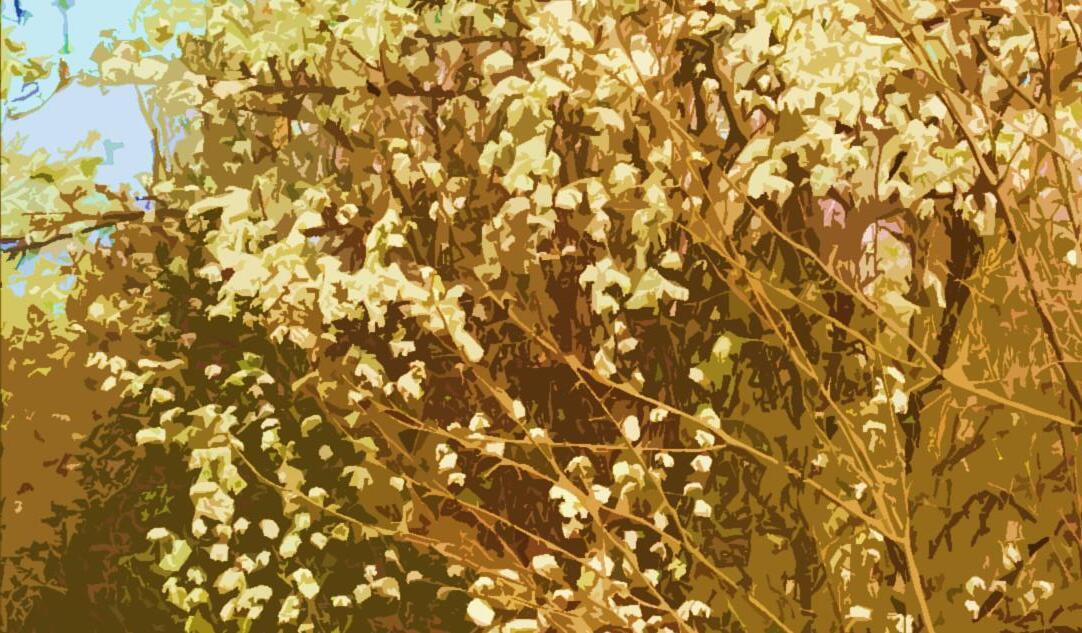
_49
